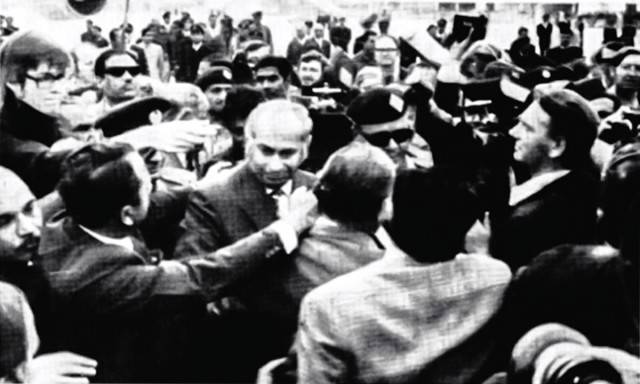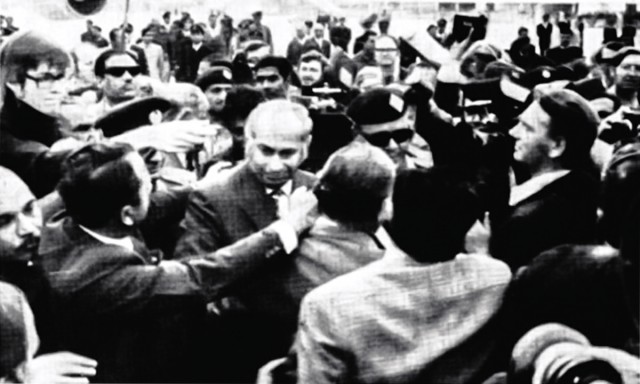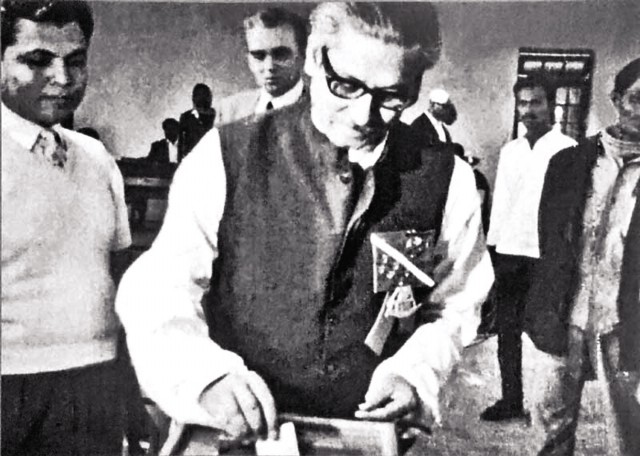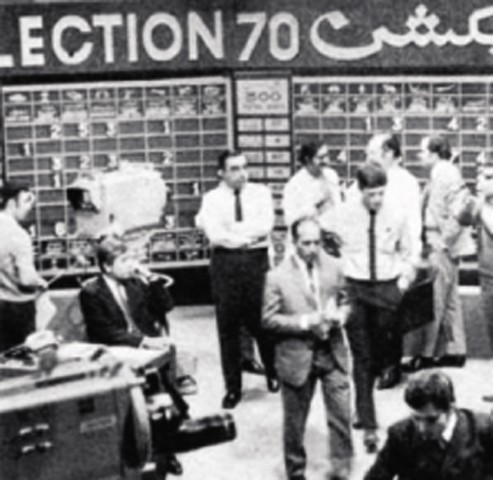
Before the election, the dishonest seers of the nation had made very many predictions and gladdened their patrons’ hearts. Sometimes the nation was told the good news that the popularity of Mujibur Rahman was a paper boat which was sinking and the people of then-East Pakistan were taking an oath upon the righteous hand of the Jamaat-e-Islami and the Muslim League. Sometimes the glad tidings were relayed that nobody favours Zulfikar Ali Bhutto except a few upstart lads.
But when the time for the electoral test arrived, we knew that the quarter of the devout was empty and the dominant majority of the nation was with “anti-national troublemakers” like Mujibur Rahman and Bhutto. How many sly stalwarts of the status quo fell in this political battle? A.K. Brohi, Javed Iqbal, Sumar, Tufail Muhammad, Ghulam Azam, Fazlul Qadir Chaudhary, Nawabzada Nasrullah Khan, Ayub Khoro, Ghulam Mohammad Khan Lundkhwar, Maulvi Farid Ahmad, Hasan Mahmud – in short so many idols that were concealed within the sleeves of the Islamists all fell on their face one by one and the nation rejected them with great contempt.
Every person knew that the sole purpose of this election was to devise a democratic constitution. Little danger remained after the majority of the Awami League in then-East Pakistan and that of the Peoples Party in then-West Pakistan that the constitution would not be framed within four months. There was a strong possibility that indeed if a compromise developed between the Awami League and the Peoples Party then the constitution could very easily be framed in the appointed period. But one could not have persisted in the that the making of the constitution or the restoration of democracy would solve the economic and social problems of the people instantly; it would require a prolonged struggle. However, the greatest historic achievement of these elections was that the religious colour which the capitalists, landlords and their political parties had given to the social problems of the people wore off after the election. The curtains of pleasant terminologies which covered the battle between capital and labour, the battle between democracy and class dictatorship, the battle between justice and oppression, the battle between poverty and abundance, the battle between knowledge and ignorance were lifted and the reality came in front in its real shape. No person dared use the sacred name of Islam now for their class interests or personal goals and if they did, they met the same fate as the Islamists in this election.

Approximately two dozen political and religious parties participated in the elections. Their manifestoes greatly emphasized a solution to the political, economic and social problems of the country and made rosy promises as well to the people but the results of the election showed that only two parties of the country, the Awami League and the Peoples Party, were acquainted with the habits and disposition of the broad masses of the nation and were those who had the knowledge of the pulse of the feelings, emotions and desires of the people. The motto of both these parties was socialism. On the other hand, the parties which had started off as claimants of the Islamic system to contest the election were totally unsuccessful in identifying the mood and conduct of the common people. They thought that no sooner would they have raised the cry of “Islam” that the people would run to garland their necks. These gentlemen made the same error in guessing the political consciousness of the people which Ayub Khan had made before them.
Sheikh Mujibur Rahman and most of his comrades were busy in political activities since the very days of the Pakistan Movement and their political party was old and experienced; but the political age of Bhutto and the Peoples Party was still very less. The systematic organization of the Peoples Party was hardly two years old at that time. In this short duration, the popularity which this party attained especially in Sindh and Punjab was astonishing. This party had participated in the elections in very unfavourable conditions. Most of the party workers were young and inexperienced, and the experienced ones were in jail. Mir Ali Ahmad Talpur, Maulana Kausar Niazi, Mairaj Mohammad Khan, Mukhtar Rana, in short many important comrades of Bhutto were deprived of participating in political activities owing to being arrested. But the Peoples Party did not become disheartened because the people were with them. It combatted hardship bravely. Its much-beloved leader raised the spirits of the people with his incendiary tours and untiring toil; so this can be said without fear of refutation that if one person deserved the credit for introducing people to socialism and defeating the Islamists, that was the personality of Bhutto. Bhutto used to say that the old leaders of Pakistan were the ancient ruins of Mohenjodaro.

Great responsibilities befell the Peoples Party and the Awami League after this success. They were no longer provincial parties and Mujib and Bhutto were not the leaders of a region but the whole nation. Now they had to prove with their word and action that they were eligible for this position and the trustees of peoples’ interest. The problems and interests of the people were the same everywhere whether they were in Sindh or in Bengal, Punjab, then-North West Frontier Province or Balochistan.

This victory was a big test for the Peoples Party. The electoral outcome at least illuminated the reality that the dominant majority of then-West Pakistan was not in the grip of prejudice, religious frenzy, sectarianism and differences of caste. But the path to political power is very difficult. The Peoples Party had to proceed further with great consideration and understanding. It had to save its organization from those opportunists who worshipped every rising sun. It had to refuse the offer of those affluent classes and individuals who let slip no opportunity to buy the consciences of sincere people and had to break the power of a pomp-worshipping and flattering bureaucracy.
At that moment, it was the heartfelt desire of those on the Pakistani left for all the left-wing parties to proceed further with unanimity and to accomplish the historic duties of the fulfilment of their slogans. The eyes of tens of millions of Pakistan’s oppressed and miserable inhabitants were directed towards them.
(to be continued)
All the translations from the Urdu are by the author. Raza Naeem is a Pakistani social scientist, book critic and award-winning translator and dramatic reader, currently based in Lahore, where he is also the president of the Progressive Writers Association. He can be reached at razanaeem@hotmail.com

But when the time for the electoral test arrived, we knew that the quarter of the devout was empty and the dominant majority of the nation was with “anti-national troublemakers” like Mujibur Rahman and Bhutto. How many sly stalwarts of the status quo fell in this political battle? A.K. Brohi, Javed Iqbal, Sumar, Tufail Muhammad, Ghulam Azam, Fazlul Qadir Chaudhary, Nawabzada Nasrullah Khan, Ayub Khoro, Ghulam Mohammad Khan Lundkhwar, Maulvi Farid Ahmad, Hasan Mahmud – in short so many idols that were concealed within the sleeves of the Islamists all fell on their face one by one and the nation rejected them with great contempt.
Every person knew that the sole purpose of this election was to devise a democratic constitution. Little danger remained after the majority of the Awami League in then-East Pakistan and that of the Peoples Party in then-West Pakistan that the constitution would not be framed within four months. There was a strong possibility that indeed if a compromise developed between the Awami League and the Peoples Party then the constitution could very easily be framed in the appointed period. But one could not have persisted in the that the making of the constitution or the restoration of democracy would solve the economic and social problems of the people instantly; it would require a prolonged struggle. However, the greatest historic achievement of these elections was that the religious colour which the capitalists, landlords and their political parties had given to the social problems of the people wore off after the election. The curtains of pleasant terminologies which covered the battle between capital and labour, the battle between democracy and class dictatorship, the battle between justice and oppression, the battle between poverty and abundance, the battle between knowledge and ignorance were lifted and the reality came in front in its real shape. No person dared use the sacred name of Islam now for their class interests or personal goals and if they did, they met the same fate as the Islamists in this election.

Approximately two dozen political and religious parties participated in the elections. Their manifestoes greatly emphasized a solution to the political, economic and social problems of the country and made rosy promises as well to the people but the results of the election showed that only two parties of the country, the Awami League and the Peoples Party, were acquainted with the habits and disposition of the broad masses of the nation and were those who had the knowledge of the pulse of the feelings, emotions and desires of the people. The motto of both these parties was socialism. On the other hand, the parties which had started off as claimants of the Islamic system to contest the election were totally unsuccessful in identifying the mood and conduct of the common people. They thought that no sooner would they have raised the cry of “Islam” that the people would run to garland their necks. These gentlemen made the same error in guessing the political consciousness of the people which Ayub Khan had made before them.
PPP had participated in the elections in very unfavourable conditions. Most party workers were young and inexperienced, and the experienced ones were in jail
Sheikh Mujibur Rahman and most of his comrades were busy in political activities since the very days of the Pakistan Movement and their political party was old and experienced; but the political age of Bhutto and the Peoples Party was still very less. The systematic organization of the Peoples Party was hardly two years old at that time. In this short duration, the popularity which this party attained especially in Sindh and Punjab was astonishing. This party had participated in the elections in very unfavourable conditions. Most of the party workers were young and inexperienced, and the experienced ones were in jail. Mir Ali Ahmad Talpur, Maulana Kausar Niazi, Mairaj Mohammad Khan, Mukhtar Rana, in short many important comrades of Bhutto were deprived of participating in political activities owing to being arrested. But the Peoples Party did not become disheartened because the people were with them. It combatted hardship bravely. Its much-beloved leader raised the spirits of the people with his incendiary tours and untiring toil; so this can be said without fear of refutation that if one person deserved the credit for introducing people to socialism and defeating the Islamists, that was the personality of Bhutto. Bhutto used to say that the old leaders of Pakistan were the ancient ruins of Mohenjodaro.

Great responsibilities befell the Peoples Party and the Awami League after this success. They were no longer provincial parties and Mujib and Bhutto were not the leaders of a region but the whole nation. Now they had to prove with their word and action that they were eligible for this position and the trustees of peoples’ interest. The problems and interests of the people were the same everywhere whether they were in Sindh or in Bengal, Punjab, then-North West Frontier Province or Balochistan.

This victory was a big test for the Peoples Party. The electoral outcome at least illuminated the reality that the dominant majority of then-West Pakistan was not in the grip of prejudice, religious frenzy, sectarianism and differences of caste. But the path to political power is very difficult. The Peoples Party had to proceed further with great consideration and understanding. It had to save its organization from those opportunists who worshipped every rising sun. It had to refuse the offer of those affluent classes and individuals who let slip no opportunity to buy the consciences of sincere people and had to break the power of a pomp-worshipping and flattering bureaucracy.
At that moment, it was the heartfelt desire of those on the Pakistani left for all the left-wing parties to proceed further with unanimity and to accomplish the historic duties of the fulfilment of their slogans. The eyes of tens of millions of Pakistan’s oppressed and miserable inhabitants were directed towards them.
(to be continued)
All the translations from the Urdu are by the author. Raza Naeem is a Pakistani social scientist, book critic and award-winning translator and dramatic reader, currently based in Lahore, where he is also the president of the Progressive Writers Association. He can be reached at razanaeem@hotmail.com


